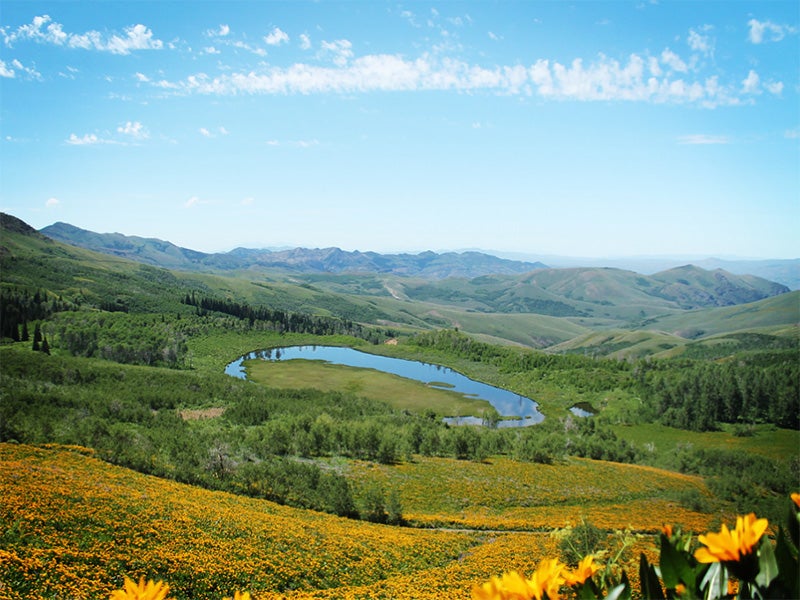Federal Court Rejects A Nevada County’s Attempt To Claim Road On Federal Public Lands
Victory
—Ruling disapproves 2001 settlement agreement between the United States and Elko County that would have given the county the right-of-way
Contact
This week, a federal court ruled against a meritless right-of-way claim to a road located in a sensitive river canyon in northeastern Nevada. The court rejected a claim by Elko County Nevada that it owns a road, commonly known as the South Canyon Road, at the edge of the Jarbidge Wilderness within the federally managed Humboldt-Toiyabe National Forest. The ruling officially disapproved a 2001 settlement agreement between the United States and Elko County that would have given the county the right-of-way. The ruling followed years of legal challenges from The Wilderness Society and Great Old Broads for Wilderness, represented by Earthjustice.
“The court recognized that the county’s claim to the South Canyon Road is not legitimate,” said Alison Flint, an attorney and planning specialist with The Wilderness Society. “Keeping the South Canyon Road in public hands is important to the future of managing this sensitive forest region. Under this ruling the Forest Service can keep a majority of the South Canyon Road open to high-clearance motor vehicles, as it has been for the past 11 years.”
Elko County’s right-of-way claim under an 1866 statute known as R.S. 2477 relied largely on evidence of early exploration, sheep herding and mining activity in a broad area of northern Elko County, but the county failed to present evidence of regular use of the South Canyon itself. The court squarely rejected Elko’s approach, concluding that “the mere possibility that a handful of people travelled through the Jarbidge South Canyon is not sufficient to establish an R.S. 2477 right-of-way.”
“The South Canyon belongs to the American public,” said Earthjustice Staff Attorney Michael Freeman. “The court’s ruling ensures that the Forest Service can continue managing this area to provide reasonable public access while also protecting the pristine Jarbidge Wilderness and the rare bull trout that rely on the Jarbidge River.”
The battle over the South Canyon Road dates back to 1995, following a flood that prompted a Forest Service proposal to replace the washed-out road with a more sustainable non-motorized trail. Elko County in turn passed a resolution asserting the road belonged to the county and directing county road crews to rebuild it. Lawsuits and legal challenges by the US government led to a 2001 settlement agreement under which the county would have seized ownership of the road.
“This technical legal case should send a clear signal to Elko County—America’s public lands will remain in public hands,” said Flint. “It is imperative that challenges of land management issues be based on fact, merit and good judgment. The South Canyon Road should have never been part of any settlement agreement. The case for doing so was meritless.”
Background/Timeline:
1995: A Jarbidge River flood washes out the South Canyon Road for the fifth time in 25 years.
1998: After the Forest Service proposes to replace the washed-out road with a more sustainable non-motorized trail, Elko County Commissioners pass a resolution asserting the road is a county road and directing county road crews to rebuild it. County representatives begin rebuilding the road with heavy equipment in July 1998.
1999: The United States sues certain individuals to enjoin them from attempting to re-build the road. After the court orders Elko County joined as a party, Elko files a counter-claim asserting that it has an R.S. 2477 right-of-way over the road.
2001: Elko and the United States reach a settlement agreement that recognizes the county’s claimed R.S. 2477 right-of-way. The Nevada federal district court approves the settlement and denies a request by The Wilderness Society and Great Old Broads for Wilderness (collectively, TWS) to intervene in the case to oppose the agreement.
2002: Ninth Circuit Court of Appeals rules that the district court improperly denied TWS’s intervention request.
2003–04: District court twice rules that the settlement does not comply with applicable laws for granting or recognizing rights-of-way on federal land.
2005: Forest Service decides to re-open most of the South Canyon Road to high-clearance vehicles and to close a short segment of the road closest to the Jarbidge Wilderness. The decision does not address the county’s right-of-way claim.
2006: After the federal district court judge retires, the newly assigned judge grants the county’s request for an evidentiary hearing, reverses the 2003 and 2004 orders, and reinstates the settlement agreement. TWS is not allowed to participate as a party in these proceedings.
2008: Ninth Circuit reverses the district court’s 2006 ruling on procedural grounds.
2008–09: Elko County unsuccessfully seeks review by the U.S. Supreme Court.
2009–14: Parties unsuccessfully pursue settlement, conduct discovery proceedings on the fact record, and brief various issues. In 2012, the case is reassigned to the Honorable Miranda Du, after the presiding district court judge takes senior status.
2014: District court rules that Elko County must prove its R.S. 2477 claim by clear and convincing evidence in order for the court to approve the 2001 settlement agreement.
2015: District court holds an eight-day evidentiary hearing on whether the county has proved its R.S. 2477 claim by clear and convincing evidence.
2016: District court rules that Elko County failed to demonstrate an R.S. 2477 right-of-way by clear and convincing evidence, or by a preponderance of the evidence, and therefore cannot approve the 2001 settlement.

Additional Resources
About Earthjustice
Earthjustice is the premier nonprofit environmental law organization. We wield the power of law and the strength of partnership to protect people's health, to preserve magnificent places and wildlife, to advance clean energy, and to combat climate change. We are here because the earth needs a good lawyer.